中西友谊观对比
- 格式:ppt
- 大小:448.00 KB
- 文档页数:12

中西方友谊观的异同友谊这一概念,在不同文化背景下有着不同的含义和表达方式。
中西方在友谊观方面的异同也因此显现。
下面将就此展开以探究此话题。
首先,在中西方文化中,友谊的定义和内容是有所差异的。
在中国,友谊被视为一种至高无上的情谊,人们强调情感和义务的方面,好朋友会帮助彼此运动,共享天赋良好,跟随人生际遇而发扬光大。
在西方,友谊被视为一种自由选择的社会关系,强调对彼此的尊重、支持和信任。
人与人之间的友谊,通常不太关注亲属或“血缘关系”,而是基于共同的兴趣、经验和相性。
此外,西方社会中更像是一种平等和相对独立的人际关系,比如在交往中一方的选择权或主导权会更大一些。
其次,在中西方人交朋友的方式有所差异。
在中国,人们通常通过人际关系和“朋友圈”来建立和维持自己的社交网络。
在西方,人们更倾向于去参加各种社交活动、加入社团或者是网络社交媒体。
虽然在中西方,朋友之间的吃饭唱歌的等娱乐场所和形式各不相同,但是均认可这是一种合适的交际方式。
最后,在中西方文化中,人们对待友谊的态度不同。
在中国文化中,友谊被视为一种重要的“人际资本”,也被一些人看作是成功和幸福的关键之一;同时,在中文里,“朋友”这个词还经常用来形容商业关系。
在西方文化中,友谊不仅被视为一种享受的快乐、寻找共鸣的关系,同时被视为是一种治愈性的社会资本。
西方社会更多地提倡从友谊中享受,以及在一些困难、痛苦的时刻中寻求支持和帮助,交友的初衷不应该只是为了以后使用。
虽然中西方友谊观存在许多差异,但在友谊的核心内涵上,都包含了尊重、关爱、理解和支持等因素的元素。
作为同时代的文明,中西方不仅可以借鉴对方发展自身的社交文化,同时也可以有所交流、融合,共同推进文化交流与交融。
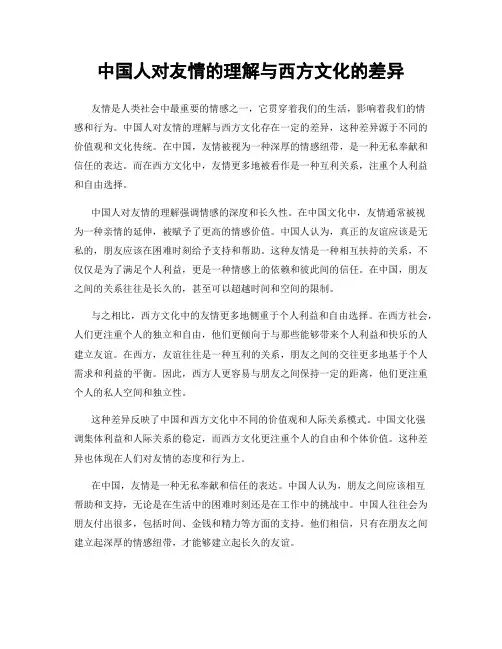
中国人对友情的理解与西方文化的差异友情是人类社会中最重要的情感之一,它贯穿着我们的生活,影响着我们的情感和行为。
中国人对友情的理解与西方文化存在一定的差异,这种差异源于不同的价值观和文化传统。
在中国,友情被视为一种深厚的情感纽带,是一种无私奉献和信任的表达。
而在西方文化中,友情更多地被看作是一种互利关系,注重个人利益和自由选择。
中国人对友情的理解强调情感的深度和长久性。
在中国文化中,友情通常被视为一种亲情的延伸,被赋予了更高的情感价值。
中国人认为,真正的友谊应该是无私的,朋友应该在困难时刻给予支持和帮助。
这种友情是一种相互扶持的关系,不仅仅是为了满足个人利益,更是一种情感上的依赖和彼此间的信任。
在中国,朋友之间的关系往往是长久的,甚至可以超越时间和空间的限制。
与之相比,西方文化中的友情更多地侧重于个人利益和自由选择。
在西方社会,人们更注重个人的独立和自由,他们更倾向于与那些能够带来个人利益和快乐的人建立友谊。
在西方,友谊往往是一种互利的关系,朋友之间的交往更多地基于个人需求和利益的平衡。
因此,西方人更容易与朋友之间保持一定的距离,他们更注重个人的私人空间和独立性。
这种差异反映了中国和西方文化中不同的价值观和人际关系模式。
中国文化强调集体利益和人际关系的稳定,而西方文化更注重个人的自由和个体价值。
这种差异也体现在人们对友情的态度和行为上。
在中国,友情是一种无私奉献和信任的表达。
中国人认为,朋友之间应该相互帮助和支持,无论是在生活中的困难时刻还是在工作中的挑战中。
中国人往往会为朋友付出很多,包括时间、金钱和精力等方面的支持。
他们相信,只有在朋友之间建立起深厚的情感纽带,才能够建立起长久的友谊。
而在西方文化中,友情更多地被看作是一种互利关系。
朋友之间的交往更多地基于个人需求和利益的平衡。
西方人更注重个人的独立和自由,他们更倾向于与那些能够带来个人利益和快乐的人建立友谊。
因此,西方人更容易与朋友之间保持一定的距离,他们更注重个人的私人空间和独立性。

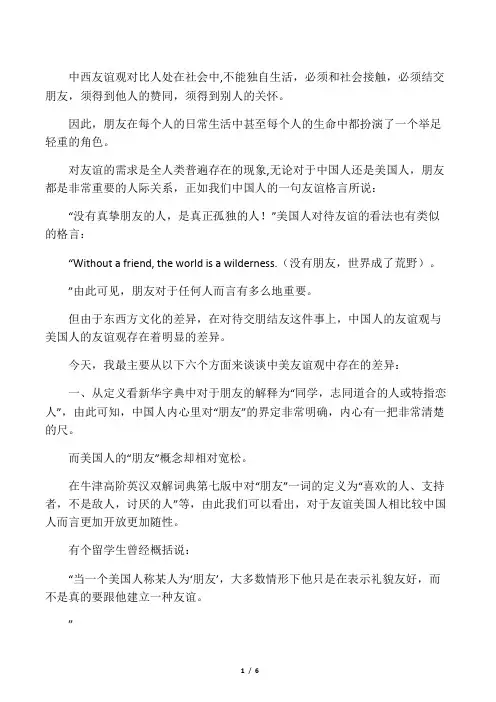
中西友谊观对比人处在社会中,不能独自生活,必须和社会接触,必须结交朋友,须得到他人的赞同,须得到别人的关怀。
因此,朋友在每个人的日常生活中甚至每个人的生命中都扮演了一个举足轻重的角色。
对友谊的需求是全人类普遍存在的现象,无论对于中国人还是美国人,朋友都是非常重要的人际关系,正如我们中国人的一句友谊格言所说:“没有真挚朋友的人,是真正孤独的人!”美国人对待友谊的看法也有类似的格言:“Without a friend, the world is a wilderness.(没有朋友,世界成了荒野)。
”由此可见,朋友对于任何人而言有多么地重要。
但由于东西方文化的差异,在对待交朋结友这件事上,中国人的友谊观与美国人的友谊观存在着明显的差异。
今天,我最主要从以下六个方面来谈谈中美友谊观中存在的差异:一、从定义看新华字典中对于朋友的解释为“同学,志同道合的人或特指恋人”,由此可知,中国人内心里对“朋友”的界定非常明确,内心有一把非常清楚的尺。
而美国人的“朋友”概念却相对宽松。
在牛津高阶英汉双解词典第七版中对“朋友”一词的定义为“喜欢的人、支持者,不是敌人,讨厌的人”等,由此我们可以看出,对于友谊美国人相比较中国人而言更加开放更加随性。
有个留学生曾经概括说:“当一个美国人称某人为‘朋友’,大多数情形下他只是在表示礼貌友好,而不是真的要跟他建立一种友谊。
”二、“友谊”持续时间在中国,友谊往往是坚固、稳定甚至是终身的。
就算是分别两地,朋友之间往往都会相互联系,或许是通过打电话或是聚会等,两者的友谊并不会随着时间的流逝而消逝。
外国人对友谊并不一定追求“永恒”,美式友谊就有些“速溶咖啡”的味道了,朋友交得快,忘得也快。
美国是全世界流动性最大的一个国家,这种流动性使得美国人的人际关系相对淡薄。
美国人对朋友的热情很快能从一个人转移到另一个人。
因此,在美国,朋友之间如果一段时间内不联系、不见面,他们的友谊就会迅速地枯萎甚至死亡。
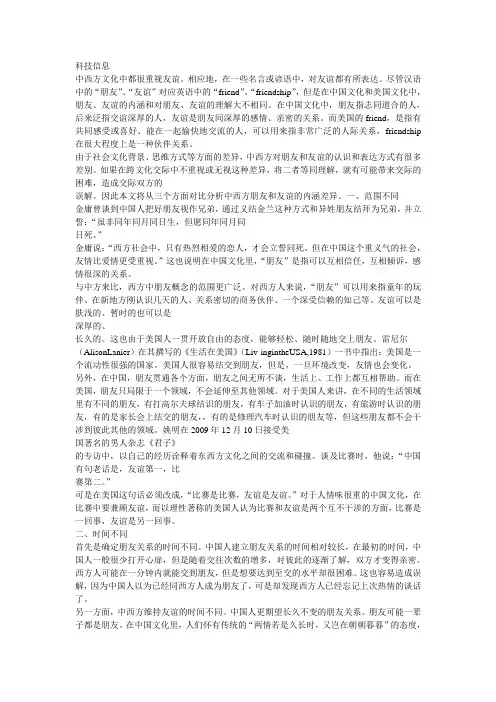
科技信息中西方文化中都很重视友谊。
相应地,在一些名言或谚语中,对友谊都有所表达。
尽管汉语中的“朋友”、“友谊”对应英语中的“friend”、“friendship”,但是在中国文化和美国文化中,朋友、友谊的内涵和对朋友、友谊的理解大不相同。
在中国文化中,朋友指志同道合的人,后来泛指交谊深厚的人,友谊是朋友间深厚的感情、亲密的关系。
而美国的friend,是指有共同感受或喜好、能在一起愉快地交流的人,可以用来指非常广泛的人际关系,friendship 在很大程度上是一种伙伴关系。
由于社会文化背景、思维方式等方面的差异,中西方对朋友和友谊的认识和表达方式有很多差别。
如果在跨文化交际中不重视或无视这种差异,将二者等同理解,就有可能带来交际的困难,造成交际双方的误解。
因此本文将从三个方面对比分析中西方朋友和友谊的内涵差异。
一、范围不同金庸曾谈到中国人把好朋友视作兄弟,通过义结金兰这种方式和异姓朋友结拜为兄弟,并立誓:“虽非同年同月同日生,但愿同年同月同日死。
”金庸说:“西方社会中,只有热烈相爱的恋人,才会立誓同死。
但在中国这个重义气的社会,友情比爱情更受重视。
”这也说明在中国文化里,“朋友”是指可以互相信任,互相倾诉,感情很深的关系。
与中方来比,西方中朋友概念的范围更广泛。
对西方人来说,“朋友”可以用来指童年的玩伴、在新地方刚认识几天的人、关系密切的商务伙伴、一个深受信赖的知己等。
友谊可以是肤浅的、暂时的也可以是深厚的、长久的。
这也由于美国人一贯开放自由的态度,能够轻松、随时随地交上朋友。
雷尼尔(AlisonLanier)在其撰写的《生活在美国》(Liv-ingintheUSA,1981)一书中指出:美国是一个流动性很强的国家。
美国人很容易结交到朋友,但是,一旦环境改变,友情也会变化。
另外,在中国,朋友贯通各个方面,朋友之间无所不谈,生活上、工作上都互相帮助。
而在美国,朋友只局限于一个领域,不会延伸至其他领域。

xxxx观对比人处在社会中,不能独自生活,必须和社会接触,必须结交朋友,须得到他人的赞同,须得到别人的关怀。
因此,朋友在每个人的日常生活中甚至每个人的生命中都扮演了一个举足轻重的角色。
对友谊的需求是全人类普遍存在的现象,无论对于中国人还是美国人,朋友都是非常重要的人际关系,正如我们中国人的一句友谊格言所说:“没有真挚朋友的人,是真正孤独的人!”美国人对待友谊的看法也有类似的格言:“Without a friend, the world is a wilderness.(没有朋友,世界成了荒野)。
”由此可见,朋友对于任何人而言有多么地重要。
但由于东西方文化的差异,在对待交朋结友这件事上,中国人的友谊观与美国人的友谊观存在着明显的差异。
今天,我最主要从以下六个方面来谈谈中美友谊观中存在的差异:一、从定义看新华字典中对于朋友的解释为“同学,志同道合的人或特指恋人”,由此可知,中国人内心里对“朋友”的界定非常明确,内心有一把非常清楚的尺。
而美国人的“朋友”概念却相对宽松。
在牛津高阶英汉双解词典第七版中对“朋友”一词的定义为“喜欢的人、支持者,不是敌人,讨厌的人”等,由此我们可以看出,对于友谊美国人相比较中国人而言更加开放更加随性。
有个留学生曾经概括说:“当一个美国人称某人为‘朋友',大多数情形下他只是在表示礼貌友好,而不是真的要跟他建立一种友谊。
”二、“xx”持续时间在中国,友谊往往是坚固、稳定甚至是终身的。
就算是分别两地,朋友之间往往都会相互联系,或许是通过打电话或是聚会等,两者的友谊并不会随着时间的流逝而消逝。
1 / 5外国人对友谊并不一定追求“永恒”,美式友谊就有些“速溶咖啡”的味道了,朋友交得快,忘得也快。
美国是全世界流动性最大的一个国家,这种流动性使得美国人的人际关系相对淡薄。
美国人对朋友的热情很快能从一个人转移到另一个人。
因此,在美国,朋友之间如果一段时间内不联系、不见面,他们的友谊就会迅速地枯萎甚至死亡。
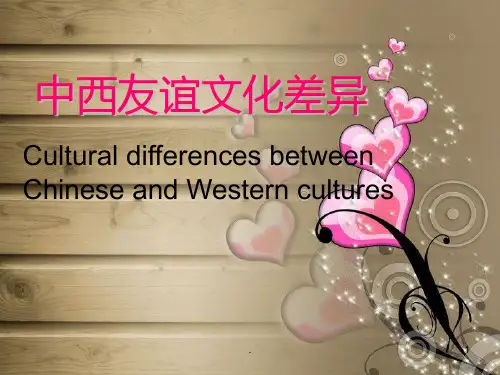
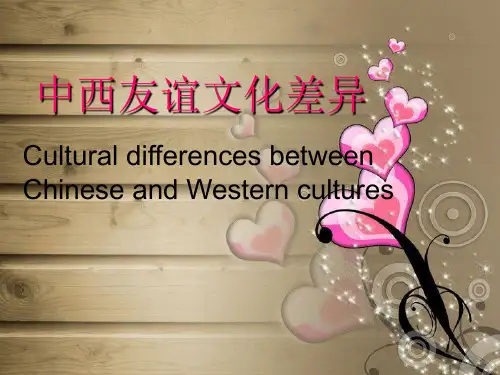
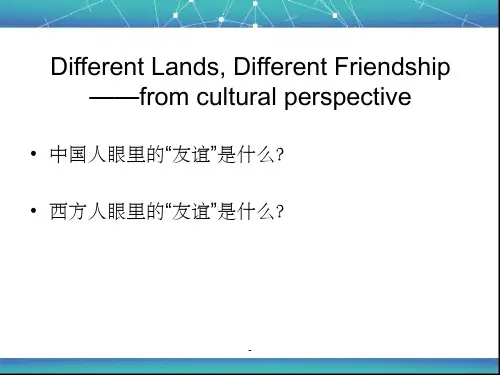

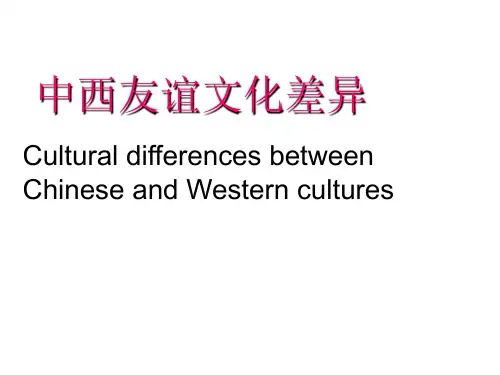
中西方对友谊的不同看法英语作文Title: Diverging Views on Friendship between China and the West Friendship, a timeless and universal bond, holds varying significances in different cultures. In comparing Chinese and Western perspectives on this topic, one finds fascinating nuances and profound differences. In the Chinese context, friendship is often seen as a deep, lifelong commitment. The Chinese value loyalty and sincerity in their friendships, often expecting mutual support and understanding even in times of adversity. Friends are not just companions for happy moments but also relied upon during challenging times. This is reflected in the Chinese saying, "A friend in need is a friend indeed," which emphasizes the importance of standing by each other during tough situations.Contrastingly, Western cultures tend to view friendship as more casual and individualistic. Westerners often value personal freedom and independence, even within friendships. They might prioritize honest communication and shared interests, seeing friendship as a source of companionship, fun, and emotional support. While loyalty and trust are certainly essential, Western friendships might not carry the same level of lifelong commitment as in Chinese culture. Another notable difference lies in the expression of affection. In China,friends might express their closeness through more physical means, such as hugging or holding hands, which are considered natural and acceptable. However, in Western cultures, physical affection might be more reserved, with handshakes or hugs often occurring only in specific social contexts.Moreover, the role of family in friendships differs between China and the West. In China, family often plays a significant role in friendships, with friends often becoming an extension of one's family. In contrast, Western friendships are generally more separate from family relationships, focusing more on individual preferences and choices. In conclusion, while friendship is a universal sentiment, its interpretation and expression vary significantly between Chinese and Western cultures. The Chinese emphasize lifelong commitment, loyalty, and family-like closeness, while Westerners tend to prioritize individualism, casual companionship, and honest communication. Understanding these differences can help bridge cultural gaps and foster deeper cross-cultural friendships.。
从影视剧看中西方文化友谊观的差异在众多的文化因素中,价值观是核心内容之一,具有持久性、稳定性,是人们对社会存在的反映,是为社会成员所普遍接受的信念。
中国与西方国家在历史、地理、风俗习惯、宗教信仰、科技与经济发展等诸多方面均有很大差异,因此,了解中西方友情观的差异就变得非常迫切和重要了。
《武林外传》和《老友记》分别是中美影视剧中最受欢迎的情景喜剧。
两者都讲述了几个来自不同地方、不同成长背景且性格迥异的年轻人机缘巧合下住到一起后发生的一系列故事。
影视剧用幽默的语言和夸张的表演展现了两拨年轻人因为情感、原则、生活发生矛盾、闹出笑话到最后和谐解决的一个个生活趣事。
作为观众的我们在被逗笑或被感动的同时,也看到了两国年轻人对待生活的态度,有相同之处也存在差异。
比如我们今天要讲的友谊观。
相同的是中美文化中都非常重视友谊,但是不能否认的是不同文化背景下的中美友谊观存在或多或少的差异。
其中最主要的就是朋友间的独立性。
一、以经济状况为主线的剧情回顾及对比在《武林外传》中,几乎每顿饭大家都是聚在一起吃的,李大嘴负责做饭,没有人去计算每个人应该承担多少饭钱,每个人都觉得这是一种很自然的现象。
谈钱伤感情是中国人常说的话,剧中的吕秀才为了讨要郭芙蓉欠他的二钱银子,委婉地提到“二泉映月”“二清关”等各种提示词汇,最后还是不敢直说是要钱。
在《老友记》中,有不少六个人一起聚餐的场景。
我们不难发现,尽管六个人经济状况不同,但是每次聚餐买单他们都是AA制。
六个人中Phonbe、Rachel经济条件较差,但在昂贵的餐厅他们宁愿什么菜都不点也不会产生让朋友买单蹭吃蹭喝的心理,同时几个经济状况较宽裕的出于尊重除非是他们设宴邀请否则也不会付掉应该别人承担的费用。
二、基于剧情的中美友谊观的差异分析――个人独立及隐私性在以上两个情节中我们可以发现,中美友谊观差异中其中一个最明显也是最主要的就是朋友间的独立性及隐私性的差异。
中国朋友之间的亲密程度是比较高的,不论是人情上还是金钱上,都存在具体的帮助和来往,朋友间有着很强的相互依赖的合作关系。
中西方对待友谊的差异英语作文**Differences in the Concept of Friendship betweenChina and the West**Friendship, a bond that exists across cultures and throughout history, often manifests itself differently depending on the social and cultural context. In this essay, we will delve into the distinct perspectives on friendshipin China and the West, examining the underlying values and expectations that shape these relationships.In the West, friendship is often characterized by a strong emphasis on individuality and autonomy. Western friends value honesty and directness, often communicating their thoughts and feelings freely without fear ofoffending each other. Independence is a cornerstone of Western friendships, as individuals are expected tomaintain their own interests and identities outside of the friendship dynamic. This autonomy extends to the giving and receiving of help; while Western friends are willing to assist each other, they also expect their friends to beself-reliant and not过分依赖.On the other hand, the Chinese perspective onfriendship is shaped by a stronger emphasis on collectivism and harmony. Chinese culture values relationships that are built on trust, respect, and mutual obligation. Friends are expected to support and understand each other, even when it comes to matters of conflict or disagreement. In Chinese friendships, directness and honesty are valued, but they are tempered by the need to maintain harmony and avoid conflict. This is reflected in the way Chinese friends interact, often communicating indirectly and using euphemisms to avoid direct confrontation.Another significant difference lies in the concept of personal space and privacy. Western friends tend to value a certain degree of privacy and personal space, expecting their friends to respect their boundaries. In contrast, Chinese culture often views friends as extensions of oneself, with less emphasis on maintaining strict boundaries. This can lead to a greater degree of intimacy and closeness in Chinese friendships, with friends often sharing more personal details and experiences than their Western counterparts.Finally, the role of time and longevity in friendships differs between China and the West. Western friendships often develop over time through shared experiences and mutual interests, with the quality of the relationship being more important than the duration. In contrast, Chinese culture values long-standing friendships, with the passage of time often strengthening the bond between friends. This is reflected in the Chinese saying "old friends are gold," which emphasizes the value of maintaining friendships over the course of one's life.In conclusion, the concept of friendship exhibits significant differences between China and the West. Western friendships are characterized by individuality, autonomy, and privacy, while Chinese friendships are built on trust, mutual obligation, and the value of long-standing relationships. These differences can be attributed to the underlying values and cultural norms that shape friendships in each context. Understanding these differences can help us better appreciate the richness and diversity of friendship across cultures.**中西友谊观的差异**友谊,这一跨越文化和历史长河的纽带,在不同的社会和文化背景下常常展现出不同的形态。
中西友谊的文化差异英语作文(中英文版)Friendship is a universal bond that connects individuals across different cultures, yet the expression and understanding of friendship can vary significantly between the East and the West.In Western society, friendship is often characterized by a sense of equality, openness, and individualism.Friends in the West tend to value direct communication, honesty, and personal space.在西方社会中,友谊通常以平等、开放和个人主义为特征。
西方的朋友们倾向于重视直接沟通、诚实和个人空间。
然而,在东方文化中,友谊则更多地强调和谐、尊重和集体主义。
东方人之间的友情往往表现为含蓄、谦逊和相互间的关心。
For instance, a Western friend might openly express their opinions and engage in healthy debates with you, viewing it as a way to strengthen the relationship.They might also prioritize their personal time and boundaries, valuing independence alongside friendship.例如,一位西方朋友可能会公开表达他们的观点,并与你进行有益的辩论,将其视为加强关系的一种方式。
The Differences between Western Friendship and ChineseFriendship西方友谊与中国友谊的差异Friendship1. Brief I ntroduction (1)2. Different Concepts of Friendsh ip (1)2.1 The friendship in the eyes of Chinese and American (1)2.2 The friendship in my eyes (2)2.3 The e xpectation from our friends (2)2.4 The things we can depend on our friends (2)3. The Methods of Building Friendships with People from Different Cultures (3)4. Conclusion (4)Friendship1. IntroductionResearch suggests that understanding of the concept of friendship varies as a result of age, gender, region, and cultural background. Intercultural friendships are characterized by differences between individuals’ cultures that bring unique cultural knowledge and broaden their perspectives. In some aspects, we should know the different cultures from different places in order to keep our friendship with other person for longer time.2. Different Concepts of Friendship2.1. The Friendship and Friends in the Eyes of Chinese and AmericanHere in China, friends do not merely remain a companion or a playmate sharing the same interest; they turn into sources of help and information providers from time to time. This is a perfect mirror of cultural difference in the perception of contributors to success. Help and information are the chiefs for success in an oriental society, while in the west people strongly emphasize personal efforts and the realization of personal value.In China, although Chinese more gentle humility, but in their heart for the definition of friend and friendship is quite clear. It is a very serious for friends and friendship. Chinese people own the friendship with like-minded friends who share the similar interests, similar personalities, otherwise they can not be real friends and they can only be regarded as ordinary.But friends and friendship in the eyes of Americans is quite different from the Chinese people. In the American dictionary, the definition of friends is very widely. In the OXFORD, friends are the person who you like, the supporter and so on. The people to meet by chance like patches of drifting duckweed can be friends. Thus, forthe friendship, the Americans more open to more casual compared with Chinese.2.2. The Friendship in my EyesFirstly, friendship means not being alone. Life is no fun if no one could share with you. Secondly, friendship means having someone we can rely on. Thirdly, friendship means being committed to others. To be a friend is the best way to have a friend. A friend should be those we loved and those who loved us.2.3. The Expectation from Our FriendsChinese friends give each other more concrete help. A Chinese will use personal connections to help a friend get something hard to obtain. They give each other money and might help each other out financially over a long time.In the West, you can certainly ask a friend to do something with you, but you recognize that your friend may say no, if he or she gives you as reason. You would not expect a friend to drop everything to respond to a non-urgent need such as shopping. Nor would you expect a friend to recognize and respond to your wishes without stating them.A friend in China is someone who offers help without waiting to be asked. There are few limits to what you can expect from a friend. You can feel free to tell your friend what he or she can or should do or help or please you.2.4. The Things We Can Depend on Our FriendsA Chinese friend will use personal connections to help a friend get something hard to obtain such as a job, an appointment with a good doctor, an easier path through an official procedure or an introduction to another person who might also be able to give concrete help. Chinese friends give each other money and might help each other out financially over a long period of time. This is rarely part of western friendships, because it creates dependence of one person on the other and it goes against the principle of equality.In a western country, as with so many other things in the west, people prefer tobe independent rather than dependent, so they do not feel comfortable in a relationship in which one person is giving more and the other person is dependent on what is being given.3. The Methods of Building Friendships with People from Different Cultures1) The only to make friends with people of different nationality is to come out of your comfort zone, to only be friends with people that you feel comfortable with. Do not be afraid to reach out.2) Express a genuine concern and care for the individuals and express a willingness to learn various things about their culture, such as any special greetings, their language, their traditions, religion, role of men and women in the family, education and foods, even tell them that you would love to try some of their foods. You will provide an atmosphere to make them feel welcome and open. However, do not ask too many questions all at the same time.3) If you have difficulties understanding someone from a different culture or if they have problems understanding you, be patient with them. Say what you need to say slowly, repeat your message if you have to, until they fully understand what you are trying to communicate4) Understand and expect there will be differences with certain issues and the way they do things, they will carry different opinions and perspective based on their culture. Embrace their differences and be at peace with them.5) Call them. Invite them to dinner, events, and activities.4. Conclusion"Friendship" is a type of companionship, which a human towards another human being or an organism can have. It's a bond in which one has a feeling towards another one. Friends will welcome each other's company and exhibit loyalty towards each。